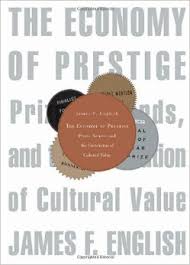Going For The Gold
 Lost in the critical cultural landscape? Adrift among competing theories? Reset your compass – most roads lead to Pierre Bourdieu. It doesn’t matter whether you think of him as a philosopher, sociologist, or French intellectual – his concepts outline the opaque and provide a consistently helpful path to understanding.
Lost in the critical cultural landscape? Adrift among competing theories? Reset your compass – most roads lead to Pierre Bourdieu. It doesn’t matter whether you think of him as a philosopher, sociologist, or French intellectual – his concepts outline the opaque and provide a consistently helpful path to understanding.
James English’s The Economy of Prestige: Prizes, Awards and the Circulation of Cultural Value is a case in point. It’s a very clever book. English, a professor of English and Director of the Humanities Center at Penn, turned an inquisitive and slightly cynical eye on the world of literary prizes in this book. Stressing the explosion of cultural awards and prizes over the past century, English hopes to make sense of the interplay of different kinds capital among competing “worlds” of understanding. That may sound very theoretical – and English does love playing with theory – but the narrative nimbly avoids the abstract and obtuse.
The bulk of the book is about literary prizes and awards. The visual and performing arts are discussed, but English’s great love is for the written word. He marks the contours of the garden of cultural production, situating the prize or award as the site of judgment and currency. Works that win prizes gain cultural capital. The prize often is monetary – capital – and its award changes the work’s value in a cultural and economic realms. Books that win awards sell more copies. The process of judging and awarding tames the “messiness” of artistic or cultural production. They render the creative digestible. This is an economic study of a different sort of economy.
English looks at awards and prizes from many angles. The physical nature of the award falls under his microscope, as do the public events: the short list, the naming, and the acceptance speech. He considers the awards as sport and as a means of cultural national norming. He also has a humorous go at alternative awards and their inverse economy. Why do we spend time considering awards for bad fiction or acting? The book consistently asks the reader to reconsider the entire world of awards and prizes.
The book’s argument, however, is also constrained by slippery nature of awards themselves. Often the product of circumstance or caprice, each has its own history, its own story. An author would really have to focus if the aim of the study was to make more powerful and compelling arguments. English, though, is not all that interested in settling down. He enjoys the topic and the space that it offers. Awards in movies or music are different from literary awards. Televised awards, whose function, it would seem, to generate viewers and revenue, have a somewhat different set of priorities than those that would adorn a book with a shiny sticker. English moves lightly past these distinctions.
Also missing from the work are the rise of cultural arts fairs. Art – flat, 3-D and time-based, have a somewhat different field of expertise and economic system than literature. They gather cultural capital from where they are sold, who purchased them, and how much was paid. The Basel or Miami Art Fair can bestow prestige in ways that a book or humanities fair cannot. A book’s cultural capital is developed in very different economies. To be fair, however, English wrote the book several years ago and draws attention to the ever-increasing number of ways that cultural production is judged and granted “value.”
So we have all that on one side of the ledger, and on the other half is a thoughtful, provocative and informed looked at the accumulation of cultural capital in the literary sphere. While I am not sure of what unit of measure is best employed, it does tally a positive balance, worthy of your consideration. But whether I would award it a prize . . . .
David Potash